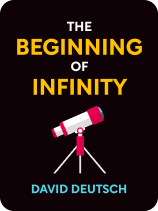

This article is an excerpt from the Shortform book guide to "The Beginning of Infinity" by David Deutsch. Shortform has the world's best summaries and analyses of books you should be reading.
Like this article? Sign up for a free trial here .
What is fallibilism? Why does David Deutsch warn against parochialism?
In The Beginning of Infinity, David Deutsch argues that there’s no limit to knowledge and that nothing is absolute. He urges us to remember that nothing can be proven true, which is called fallibilism.
Read below to learn more about fallibilism and how science advances through mistakes.
The Importance of Embracing Fallibilism
Several times throughout The Beginning of Infinity, Deutsch warns against what he calls parochialism: That is, mistaking one’s own experiences for universal truth. Parochial refers to a church parish, but in more general terms it means having a narrow or shortsighted outlook. Deutsch uses it to evoke the image of a priest dictating “truth” to his congregation—the exact opposite of the endless search for knowledge that Deutsch wants. (Shortform note: The opposite can also be true: the “Argument from Incredulity” is a logical fallacy in which a person dismisses an idea as crazy or illogical because it contradicts their own experiences or belief system.)
So what is fallibilism? The author urges us to remember that science can’t prove something is true; instead, it disproves what is false. In other words, we gain new knowledge by correcting our mistakes. He calls this fallibilism: remembering that there’s no such thing as perfect knowledge and that nobody should be considered the absolute authority on any subject. Deutsch humorously suggests that we replace the word theory with misconception (as in, “the misconception of gravity”) to make the point that theories will never be completely right; they can only become less wrong.
In short, there’s always the chance that what we “know” could be proven wrong. Even something as fundamental as the theory of gravity could still be disproven if a scientist could demonstrate a phenomenon science can’t explain; say, a rock falling sideways instead of toward the earth. So far, nobody has managed to disprove gravity, but it’s still possible that someone could.
On a related note, Deutsche defines a “good” or “bad” explanation of a phenomenon based on how hard it would be to change the details of that explanation without destroying it. To continue with the theory of gravity, it would be very hard to change the details—that mass attracts mass with a particular amount of force—without making the whole explanation useless. If we proposed instead that mass repels mass, or we changed the theorized amount of force, then the theory would no longer explain what we observe in the universe. Therefore, gravity is a good explanation of those phenomena.
How Science Advances Through Mistakes
Deutsche claims that science progresses by becoming less and less wrong. In The Structure of Scientific Revolutions, physicist and philosopher Thomas Kuhn explains that science makes its biggest advancements (scientific revolutions) by recognizing and correcting mistakes. For example, the shift from the geocentric (Earth-centered) model of the solar system to the heliocentric (sun-centered) model required just such a revolution.
Kuhn’s proposed steps of a scientific revolution are:
- Normal science. This is what most people imagine as “science”: incremental improvements to existing knowledge through study and experimentation.
- Anomaly. Scientists observe a phenomenon that current scientific theories can’t explain. New theories arise to explain it. For example, astronomers noticed that planetary movements didn’t line up with their predictions based on the geocentric model.
- Crisis. Two or more theories compete to be accepted as the new “correct” theory. Famously, Copernicus proposed the heliocentric model of the solar system. He met fierce resistance, even though his theory explained the anomalies that astronomers had found.
- Revolution. Through continued experimentation and debate, one of the new theories overturns the existing theory as the dominant idea in the scientific community. Now, of course, nearly everyone accepts the heliocentric model as correct—and will continue to do so until or unless scientists find more anomalies that this theory can’t explain.

———End of Preview———
Like what you just read? Read the rest of the world's best book summary and analysis of David Deutsch's "The Beginning of Infinity" at Shortform .
Here's what you'll find in our full The Beginning of Infinity summary :
- That there is an infinite amount of knowledge in the universe
- Why humanity must never stop learning
- How new knowledge changes civilization for the better






